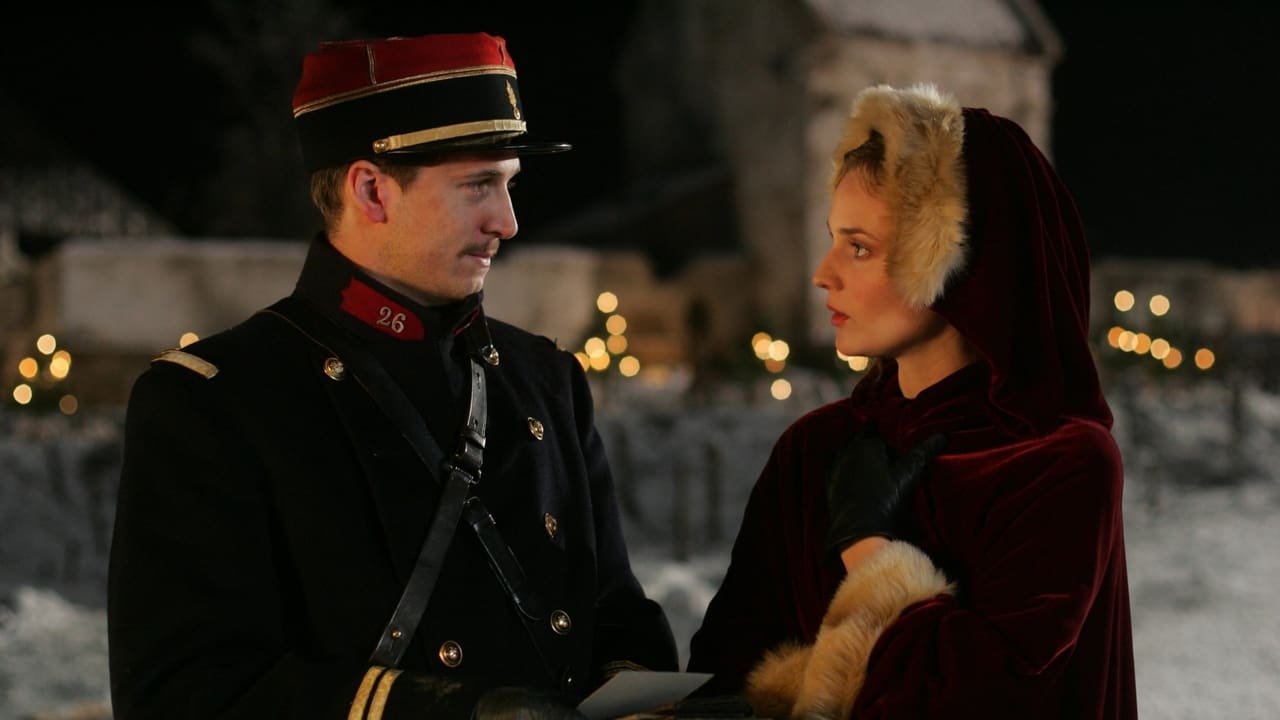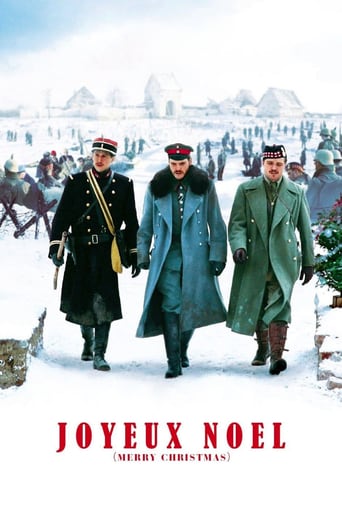

The reason why I decided to sit down and watch this movie is because I heard about it and decided that it looked like an interesting movie and certainly one which will demonstrate the pointlessness of stuff like this. When I found it I decided to sit down and watch it and this movie succeeds in what it was trying to do.The plot is that as the French, German and Scottish armies are fighting World War One, they all decide one night to cease fire - Christmas Eve. As the sides come out of their trenches they share photographs, items such as champagne and have a musical performance by German opera singers (one who happens to be in the war, the other is his girlfriend) and a mass. The next day they can't go through with killing people who a few hours ago were considered friends. They then decide to hold the cease fire for a little longer to collect dead bodies and bury them and after that they have a football match.There are a few complaints with this movie so I'll just list them. The action is awful. I know it might be a nitpick because there is only 2 action scenes in this movie but it's the kind where I had no idea what is going on. I would also say it is easy to tell that Diane Kruger and Benno Furmann were dubbed in their singing voices, I mean both do pull through really good performances but this is really obvious.Everything else however is really good, I'd say one of my favourite scenes in this movie is when the medic/priest is asked to go back to the parish by another, higher priest and then the higher priest gives a sermon on why killing the Germans who they once considered friends is good, and this isn't an over-the-top shout (nor is any other person who tries to say killing the opposing sides they shared stuff with is a good thing).The acting is fantastic, the writing is really good and so is the directing and the cinematography. Everything the movie wants to say is said really well and it was certainly right to give it a nomination for best foreign language film (although how did that work when three languages are spoken and they're pretty well evened out).My advice is if you want something to watch for Christmas this year then this is certainly one I'd suggest you'd consider. If you're an atheist or non-Christian (which I am) then I'd also suggest checking this one out. If you like War movies then this doesn't really have the action of one but it does have the drama of one. If you're looking for some kind of blend then I'd also suggest this.
... View MoreJoyeux Noel or Merry Christmas should be shown every year on television. It is beautiful movie about the true meaning of Christmas. The director does a brilliant job in depicting three military units like the Germans, French, and the Scottish who are fighting the first Christmas away from their loved ones and facing an invisible enemy. While they stop and have informal and unauthorized ceasefire on Christmas Eve. The soldiers whether German, Scottish, or French begin a platonic fraternization of brotherhood. It's nice to see a film about war that isn't. As they become friends, they share good times even for a brief time. Their leaders will face the consequences of resisting to continue battling in no mans land. Yet there are beautiful moments like when they start singing together and playing music. It's still a great film and should be viewed around the holiday season.
... View MoreThis is The Best Christmas Movie to watch on Christmas/Eve. Even better for Christmas than 'It's A Wonderful Life.' It displays the true Spirit of Christmas that the soldiers experienced, ending at the foot of the cross with all its meaning. The Christmas truce actually happened on many fronts in WWI, but it was mainly to bury their dead. The screenplay is a compilation of many stories. In real life there was a cat that went between both sides, but when it turned up with a new collar, it was shot by the other side for spying (typical SNAFU with officers following the letter of the absurd). As always there is just plain stupidity in killing each other which the movie exemplifies along with the contrast between basic goodwill, moral duty and institutionalized hatred.
... View MoreAmong the many films that take place during Christmas, most succeed in entertaining. Some give a credible message of hope with which audiences genuinely identify.However, only two movies of which I know succeed in moving audiences and rekindling their hope in the virtues of which mankind is capable: "It's A Wonderful Life" (1946), and this movie."Joyeux Noel" is not just a Christmas movie. I imagine anyone who sees this film will make an emotional connection to it regardless of their race, color, or creed.Based on a true story, the film chronicles the start of what was then known as the Great War, but what we know today as World War I. It's hard to believe when you read about WWI in a text book, but at the time, it was the bloodiest war in (then) recent memory.It's also easy to forget how senseless the war actually was from the very beginning. However, this film succeeds in emphasizing the inhumanity of war through a brilliant beginning montage of children from England, France, and Germany reciting actual text from each nation's respective official war declarations.Putting children in these parts was a smart move, because your attention wouldn't perk up if an adult was saying these lines. When children are seriously discussing war in a classroom, and not on the playground, you know something's amiss. Adding to the cold authenticity, the children speak in their own languages."Joyeux Noel" was filmed and financed in France, Germany, Romania, and Scotland. It's important to note this fact because if it got near Hollywood, EVERYONE in it would be speaking English, a move that regularly damages the credibility of many American films that take place overseas.The film continues showing civilians from France, Germany, and Scotland right when war breaks out in 1914. One young Scottish man is excited to enlist, stating that it is the "start of (his) life". His local priest, Father Palmer (Gary Lewis), is not so sure.You are also introduced to two famous German opera singers who are also lovers, Anna Sorenson (Diane Kruger) and Nikolaus Sprink (Benno Furmann), whose voices are heaven sent. Neither singer is required to enlist in the Great War, but they are both sent to the German front lines to entertain the troops on Christmas Eve.After a few more introductions, we see the Western Front of the war in France, with French, German, and Scottish soldiers engaging in combat that is far from romantic. You see the trenches, not so much of the actual combat, but you don't have to guess how ugly the war actually was.Even worse, these soldiers are fighting on Christmas Eve, when many of them looked forward to returning home to their families. Eventually, what begins as Anna and Nikolaus singing for the German soldiers results in the lieutenants of each platoon agreeing to a Christmas Day ceasefire. However, thanks to these opera singers, what further evolves becomes something more uplifting and moving than just a day off.In 1914, the Great War was far from over. To those fighting in it, there seemed to be no end in sight. However, on that Christmas Eve, as this film so brilliantly elaborates, the battle grounds became an actual common ground for all the troops. Seeing that gradual metamorphosis of the land and the soldiers is truly breathtaking.From this point of the movie on, you may become an opera fan if you weren't one before seeing this film. You will look at the World War I German army in a far better way if you're an American or British person. World War II may be a different story, but go along with me here.Finally, you may never listen to "Adeste Fideles" (the Latin version of "O Come All Ye Faithful") the same way again. It's even more astounding how great holiday songs become better through the darkest of times, and that is probably the point of the entire movie.Just like "It's A Wonderful Life", "Joyeux Noel" details a bleak time in history, and shows how the human spirit of generosity can make a world of difference through even the darkest times. The comparisons to the 1946 classic don't stop there."Joyeux Noel" has a story line that gradually builds to a grand conclusion, and the sum of the previous events is not equal to its parts. Like "It's A Wonderful Life", the thrill is seeing how all the circumstances come together to create that conclusion. It may be complicated to detail to friends, but once you see the movie, you realize it's more profound than just cocktail party chatter.While these two movies differ greatly in their plots, they also have a few other things in common. "Joyeux Noel", with a budget of $22,000,000, made less than that worldwide, thereby making it a flop. It also was nominated for an Academy Award for Best Foreign Language Film in 2005, but lost.However, just like "It's A Wonderful Life", it will be considered a classic soon. It may not be next year, but it could be 10 years from now, or even 20. It's not just an entertaining film, but a truly great and important film.There are no magic tricks in this film to remind the characters about the true meaning of the holiday season, and for good reason. Kindness and charity are things of which all humans are capable even in terrible times. "Joyeux Noel" gets that idea. I only hope that others who see this remarkable cinematic achievement will take away that message, and still come back to the movie year after year.
... View More